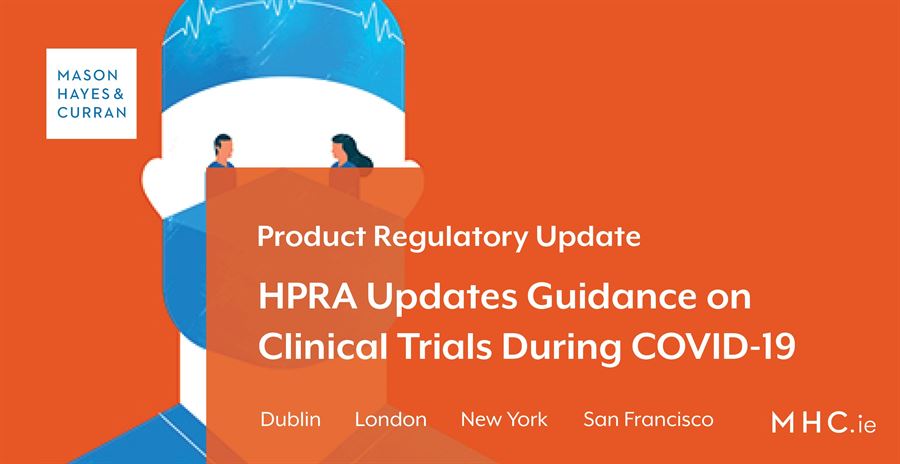
The Health Product Regulatory Association (HPRA) is responsible for protecting and enhancing public and animal health through the regulation of medicines, medical devices and other health products. The HPRA is cognisant of the fact that sponsors and investigators may need to alter their approach to clinical trials, to take account of changing circumstances in light of COVID-19. In its most recent guidance issued on 2 April, the HPRA has stressed that in doing so, parties may not abandon the trial protocol. The urgent safety measure mechanism, provided for under current legislation, may be used by the parties where deviations from the protocol need to be made prior to relevant ethics committee or HPRA approval being obtained.
Trialling home delivery
![]() The HPRA has updated its previous guidance, published on 26 March 2020. The guidance provides that in addition to considering guidance from the Pharmaceutical Society of Ireland on the home delivery of medicines as part of its decision-making process as to whether home delivery of investigational medicinal product (IMP) is permissible, the investigator may also consider the Joint HSE and PSI guidance on home delivery of medicines. However, as the HPRA notes, this guidance relates to the retail supply of authorised medicines, and is not specific to the home-delivery of IMPs to trial subjects who may not be able to attend the trial site. It would be prudent for investigators to obtain legal advice prior to undertaking home delivery of the IMP.
The HPRA has updated its previous guidance, published on 26 March 2020. The guidance provides that in addition to considering guidance from the Pharmaceutical Society of Ireland on the home delivery of medicines as part of its decision-making process as to whether home delivery of investigational medicinal product (IMP) is permissible, the investigator may also consider the Joint HSE and PSI guidance on home delivery of medicines. However, as the HPRA notes, this guidance relates to the retail supply of authorised medicines, and is not specific to the home-delivery of IMPs to trial subjects who may not be able to attend the trial site. It would be prudent for investigators to obtain legal advice prior to undertaking home delivery of the IMP.
The other significant update in this guidance also relates to the delivery of IMPs to trial subjects. The guidance provides that it is not appropriate for the sponsor to supply the IMP to trial subjects. This is something that all parties to the clinical trial should bear in mind.
As in previous guidance, the HPRA continues to advise that:
-
The safety of trial subjects is of paramount importance. The parties must carry out a benefit-risk analysis in terms of risks to trial subjects, in considering whether to suspend a clinical trial.
-
The parties to the trial need to consider how to manage the data protection implications of sponsor or investigator staff working from home. The HPRA guidance notes that sharing of trial subject data off-site is generally unacceptable. The parties should ensure that the sharing of any subject data is done in a manner that complies with data protection law.
-
It will prioritise COVID-19 related activity in connection with clinical trials, whether this relates to applications for new clinical trials which focus on COVID-19 research, or deviations which need to be made to existing trials as a result of COVID-19 measures.
-
Investigators and their teams may need to consider the adoption of technology which permits them to monitor trial subjects for any adverse events. The guidance notes that this type of monitoring is limited in terms of effectiveness. It provides that provision of the IMP to trial subjects in a healthcare facility is best practice, notwithstanding the potential risks associated with COVID-19.
Conclusion
This guidance is likely to be updated regularly as the approach to the current pandemic develops. Parties to clinical trials should remain alert to the potential impact of the current crisis, including restrictions on movement and social distancing measures on the conduct of ongoing clinical trials. Parties should seek legal advice where necessary to address areas of uncertainty. Investigators should closely follow the guidance where deviations from the protocol need to be made due to COVID-19 disruptions prior to relevant ethics committee or HPRA approval being obtained.
If you have any questions in relation to the new guidance, please contact a member of our Product Regulatory or Product Liability teams.
The content of this article is provided for information purposes only and does not constitute legal or other advice.





